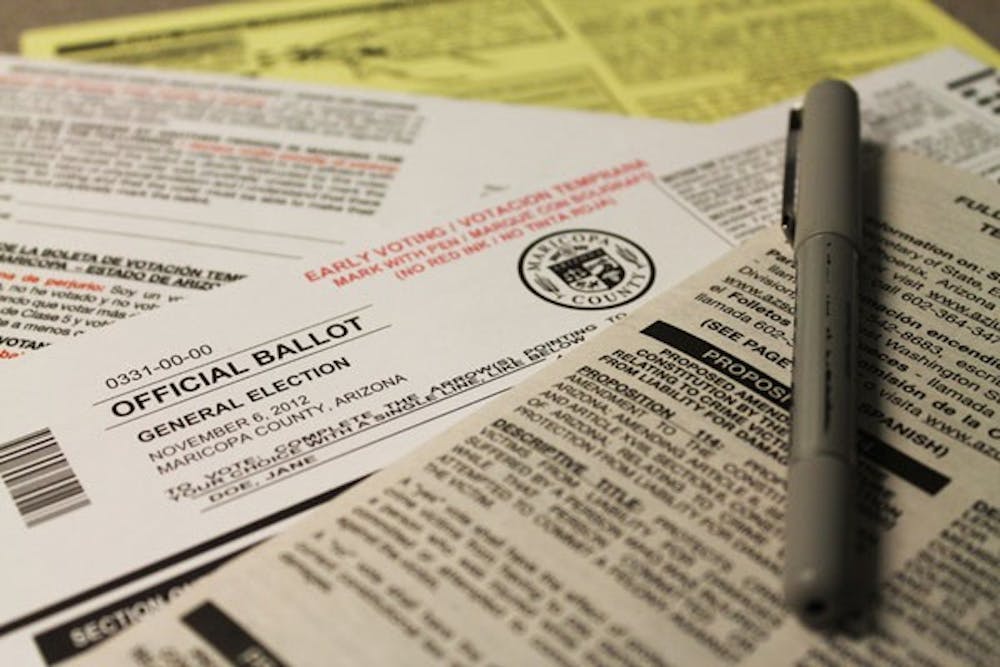With less than two weeks remaining between now and Election Day, many Arizona voters have faced difficulties due to incorrect addresses and dates being printed on their ballots.
Now, a new issue rises among voters: Due to a federal judge ruling against Democrats' efforts to block a law prohibiting early ballot collection, it remains a felony for get-out-the-vote groups to collect early ballots for those unable to make it to their polling places on Nov. 8.
Under Arizona law, it is a misdemeanor offense to disable or remove a voting machine from a polling location, according to A.R.S. 16-1018.
However, according to House Bill 2023, it is a class six felony for an ineligible person to collect early ballots to drop off to a polling location. Exemptions include election officials, caregivers, family members and those living in the same household as the voter whose ballot is being collected.
The bill was signed into effect by (R) Gov. Doug Ducey.
AZ Voter Protection Director Spencer Scharff said it’s a pressing matter for voters to have to deal with not being able to deliver an early ballot for certain groups of people. He said the supporting argument of HB 2023 — that group-based early ballot collecting could lead to voter fraud — is a fraudulent argument itself.
“The proponents of HB-2023 did not produce a single incident of (voting fraud) when passing it," he said. "It was all based on speculation and hearsay.”
Scharff said voter accessibility should be just as important as the right to do so.
“What I focus on in my job is not just protecting the right to vote, but also the ability to vote,” he said. “The right to vote is meaningless if it also doesn’t come with the ability to vote.”
ASU Young Democrats president Austin Marshall said the passing of the bill was a political move against Democratic voters.
“This is a whole scheme by the Republicans to suppress turnout, especially among poor voters, younger voters, older voters, and voters that are of minorities,” he said.
Marshall said the bill — which Ducey called a "common-sense approach to maintaining the integrity of (the) elections," — is anything but.
“It’s a common sense approach to be able to suppress the vote,” he said. “I mean, the issue here isn’t maintaining the integrity of our elections. The integrity of our elections are very well maintained, and cases of voter fraud are infinitely small and not even pertinent to the conversation.”
Youth for Johnson/Weld at ASU president David Howman said his campaign’s difficulties don’t come from voter suppression, but rather from a paradoxical lack of exposure.
“In regards to the Libertarian campaign, I think most of that more so relates with name recognition not getting enough attention,” he said. “It’s a catch-22 where you have to get a certain amount in the polls but then they don’t include you in all the polls because they don’t think you’re getting enough attention, so it’s this vicious cycle.”
Howman said he supports the idea of get-out-the-vote groups collecting early ballots, but he also believes it comes along with the possibility of voter fraud.
“If these ballots can be collected by other people in the get-out-the-vote organization, I think that would help a lot because you’re getting more voices actually contributing,” he said. “I do think there needs to be some degree of oversight … because it does open up for voter fraud potential.”
Howman said that while the practice of ballot collecting likely won’t surface in this year’s election, he believes a movement toward digital voting could lead to increased voter engagement and shorter waiting lines.
“My biggest question is, why in 2016 do we not have an electronic form of voting?” he said. “A lot of the reason people don’t vote is because they just don’t have the transportation, they don’t know where to go, how to get there, or they’re just too busy. If we were able to work in an online system, then I think that would increase voter participation by 20 percent at least.”
ASU College Republicans president Kevin Calabrese shares the same sentiment and said the voting system should be digitally updated for the sake of convenience.
”I think online voting would make it so that those who don’t have access to a vehicle to drive to the polls or those who don’t feel like dropping off their ballot in the mailbox would be able to easily vote,” he said. “I think the voting system is a little outdated and really needs to be updated for the 21st century.”
Calabrese said he believes ballot collecting by get-out-the-vote groups could lead to many cases of voter fraud due to the possibility of hidden political bias within these groups.
“There’s no guarantee the harvester will drop off the ballot at the recorder’s office” he said. “If the ballot harvester has bias toward Democratic or Republican voters, they might — by looking up the registration of that voter — choose to drop off or not drop off that ballot. That’s pretty much how it puts everything at risk.”
Calabrese also said Democratic groups partake in ballot collecting more often than Republican groups because of Arizona’s reputation as a red state.
“I think they use it more often because Arizona is a Republican-leaning state, so they already have an uphill battle to try to — at least for state level elections — get as many Democrats to vote and get as many Democrats registered to be voters as possible,” he said. “It’s probably just more of a last-minute option for them.”
Reach the reporter at angel.n.mendoza@asu.edu or follow @angelnikolas96 on Twitter.
Like The State Press on Facebook and follow @statepress on Twitter.




